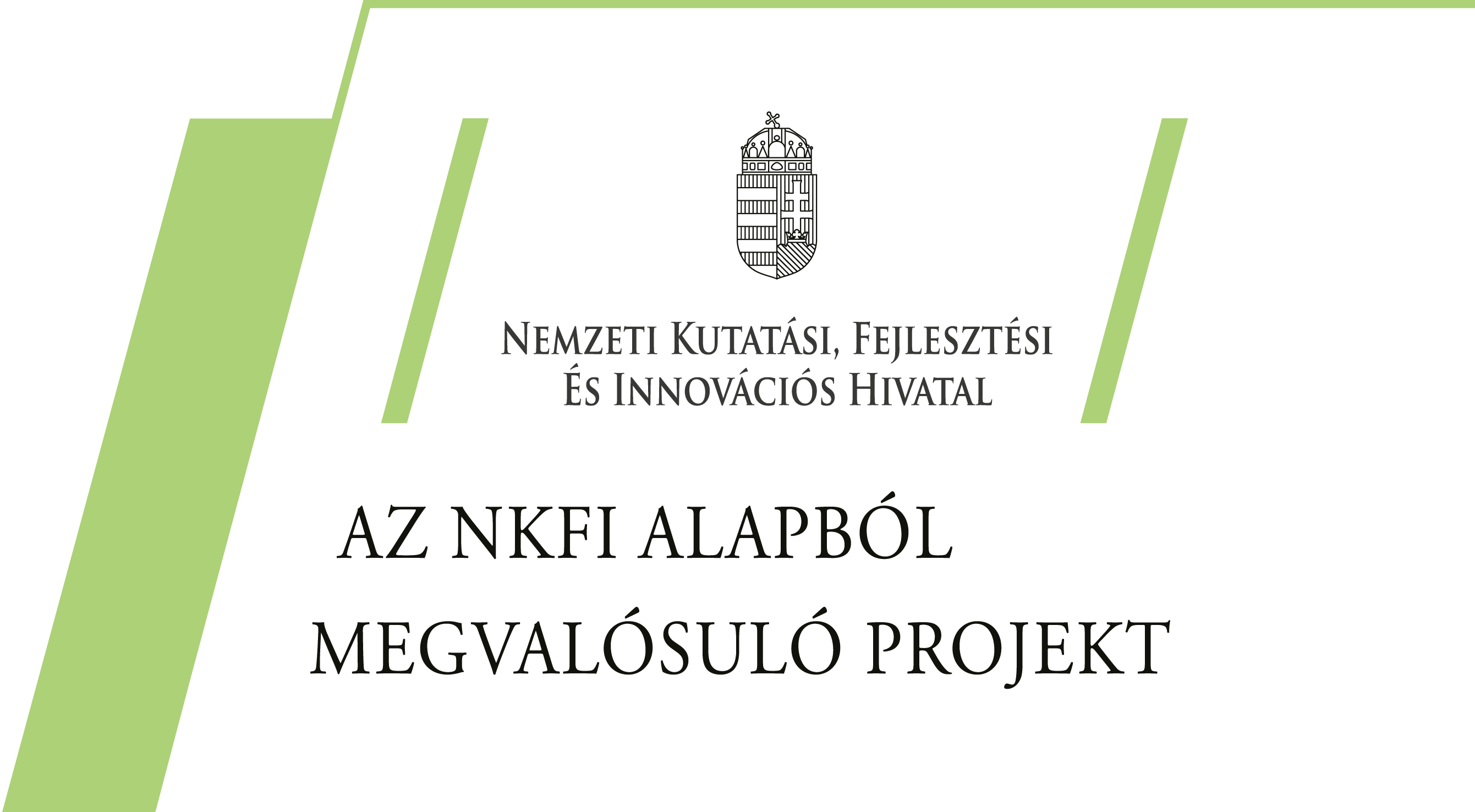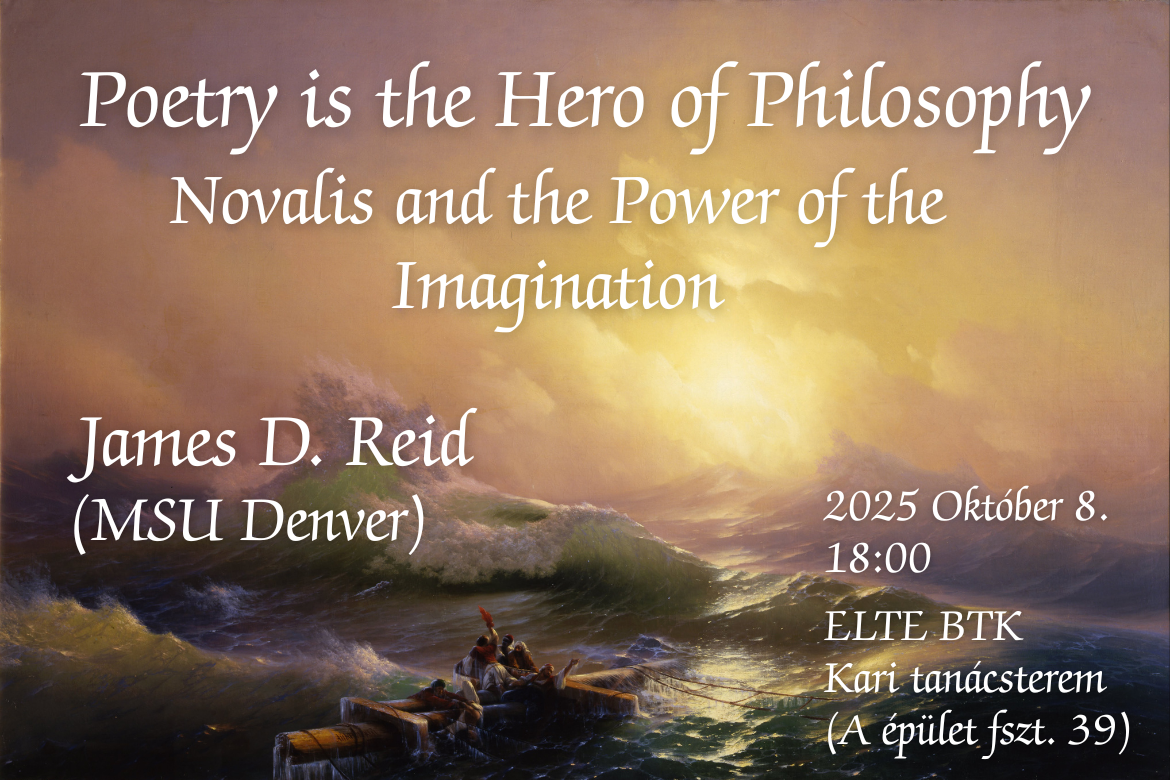Az ELTE HTK Filozófiai Intézet és az ELTE BTK Filozófia Intézet szeretettel meghív minden érdeklődőt James D. Reid (Metropolitan State University of Denver, Colorado, USA) professzor 'Poetry is the Hero of Philosophy': Novalis and the Power of the Imagination című előadására. Az előadás angol nyelven fog elhangzani.
Időpont: 2025.10.08. 18:00–20:00
Helyszín: ELTE BTK Kari tanácsterem, 1088 Budapest, Múzeum körút 4. A épület, földszint
A veritable history of European philosophy, stretching back to the ancient Greeks, could be written centered on the place of the imagination (phantasia, imaginatio, Einbildungskraft, etc.) in human life and experience, cognition, morality, and philosophy. Philosophers have been both drawn to what Kant describes as the ‘capacity to make the absent present’ and repelled by its ability to carry us away from reality and truth. At times, the critic and the proponent of imagination turn out to be the same. Plato’s Socrates attacks the imaginative achievements of Homer in a dialogue that is itself an imaginative achievement. Descartes argues in the Meditationes de prima philosophia that the imagination is nothing essential in the mind’s pursuit of truth and often gets in the way of our cognitive endeavors, but he offers an imaginative fable of physical reality in Le Monde meant to capture some (possible) truths about the world In the moral sphere, the place of the imagination is hotly contested. There are those who insist (Kant, e.g.) that reason alone is able to determine what’s to be done or avoided and those who make room for imaginative work in entering into the lives of others (David Hume, Adam Smith, among others). And there is a longstanding debate over whether philosophy itself should be viewed as a purely rational endeavor or one that makes use of imaginative deviations from so-called reality. The German philosophical poet Novalis (1772-1801) inherits this long tradition of reflection on the place of the imagination in human life and brings it to something of a culmination. Beginning with an elaborate set of notebook entries ostensibly devoted to the post-Kantian idealist Fichte (the so-called Fichte-Studien), and continuing into his late lyric output composed shortly before his death, which include the Hymnen an die Nacht and the Geistliche Lieder, Novalis places the imagination at the very center of human existence, as the Grundkraft of the human soul, at times replacing or substituting for reason itself. Although he acknowledges the pathologies of Einbildungskraft, he consistently sees the imagination as at once a capacity for cognition at the most basic level of perception (a view he inherits from Kant and Fichte), the power to give shape to visions of the whole of reality, beyond what perception appears to give (in what we might call a poetics of nature and natural science), and a force in our moral and political education and development (a position he probably takes over from Schiller). And while Novalis never published a system of philosophy, comparable to Schelling’s or Hegel’s, his conception of philosophy itself cannot be divorced from his views on the imagination; he sees philosophy as anchored not in one or more first (indubitable) principles but in certain imaginative fictions. The proposed talk will track Novalis’s views on the imagination from the Fichte-Studien to the Hymnen an die Nacht, revealing its role in perception, higher-order cognition (including philosophy and science), moral and political theory and practice, and, perhaps more importantly, its ability to orient human beings in larger spaces of significance. Along the way, I will situate Novalis’s views on the imagination in relation to more ancient positions (especially Plato’s and Aristotle’s) and to the theories of his predecessors and contemporaries (notably Kant’s and Fichte’s). Throughout Novalis’s writings, the imagination is the fundamental ability to bring things together, to unify everything under the tentative aspect of the One. But he also expresses deep skepticism regarding our finite capacity to achieve the unity we all seek (“We seek the unconditioned everywhere but always find only conditioned things.”). As I hope to show, Novalis’s theory of the imagination incorporates both confidence and humility facing what he takes to be the supreme power of the human soul and its ultimate ends. The true life might be absent, but we are in the world; and the world shows up for us and becomes intelligible on the basis of imaginative work. A Chicagói Egyetemen szereztem doktori fokozatot. Jelenleg a Denveri Metropolitan Állami Egyetem filozófiaprofesszora vagyok. Érdeklődési köröm a kora újkori, valamint a 19. és 20. századi európai (különösen német) filozófia története, középpontjában az axiológia, az etika, az esztétika, valamint az irodalom-, költészet- és filmfilozófia áll. Kantról és utódairól (például Novalis, Dilthey és Heidegger) könyveim jelentek meg elsőrangú tudományos kiadóknál (pl. Cambridge University Press és Oxford University Press), valamint tanulmányok neves nemzetközi folyóiratokban. Emellett elismert angol nyelvű német filozófia- és költészetfordító is vagyok. Ezen a téren elért eredményeim közé tartozik Rainer Maria Rilke Duineser Elegien című művének fordítása és filozófiai kommentárja, szem előtt tartva Platón (vagy Szókratész) híres vitáját a filozófia és a költészet között az Államban (Being Here Is Glorious: On Rilke, Poetry, and Philosophy [Northwestern University Press, 2015]), valamint Novalis válogatott filozófiai és költői írásainak átfogó kiadása (Novalis: Philosophical, Literary, and Poetic Writings [Oxford University Press, 2024]). Munkám gyakran foglalkozik a képzeletnek az emberi megismerésben, valamint az erkölcsi tapasztalatban és elméletben való természetével, és azzal a szerepével, amelyet a létezőnek mondható megfoghatatlan egészének megragadásában játszik. Az egyik első jelentős publikációm, amely a The Review of Metaphysics című folyóiratban jelent meg, a képzelet ismeretelméleti szerepével foglalkozott Kant és Fichte munkásságában, mely szerint a képzelet egyesítő erővel bír a világhoz való kognitív viszonyunkban. A cselekvőképesség, a fantázia és az érzékelés közötti összetett kapcsolatokat a filmről szóló nemrégiben megjelent könyvemben (Agency and Imagination in the Films of David Lynch) vizsgáltam. Emellett a Bloomsbury Studies in Philosophy and Poetry sorozat társalapítója és szerkesztője is vagyok. 





